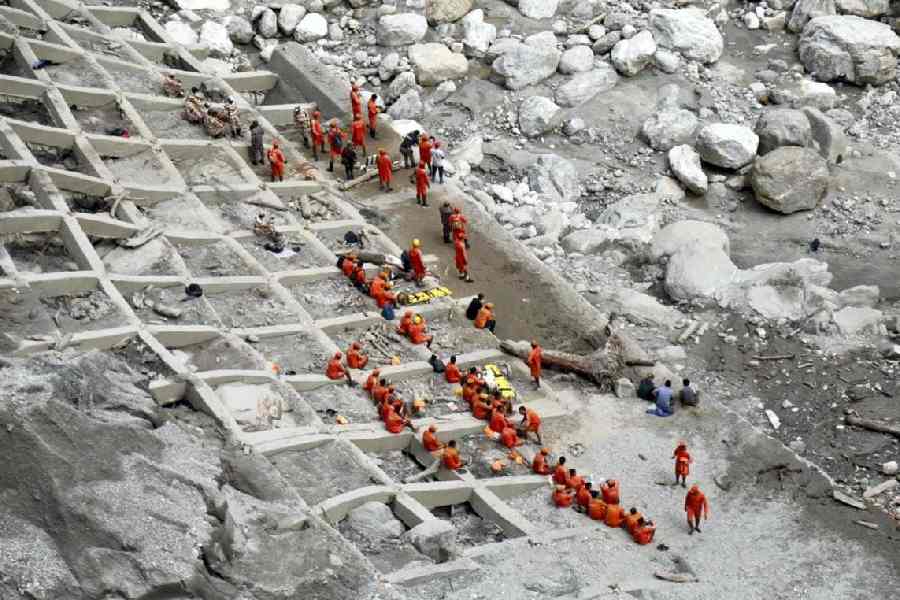While the world’s attention is riveted on Gaza, a disaster in the hills of North Sikkim is yet to abate and is crying out for attention. India is poised on a keg of catastrophic dimensions in its mountain belt. And all of it can be attributed to human machinations, apathy and ‘political compulsions’.
On the night of October 3 and 4, Sikkim’s South Lhonak glacial lake burst its bank and washed away the 1,200 megawatt hydroelectric project, the state’s biggest, in Chungthang. Its impact triggered a cataclysm with the Teesta III dam collapsing, submerging the landscape and washing away precious lives.
Today, the National Green Tribunal’s principal bench will hold a hearing on this breach in the Sikkim Urja Teesta Stage-III dam at Chungthang during the recent flash flood. Notices have been issued to the Sikkim government, Sikkim Urja Limited and the National Hydroelectric Power Corporation Limited.
Predictably, the political parties of the state are busy trading charges. It is the affected residents whose plaintive cries go unheard. Dipsika Gupta Prasad, a resident of East Sikkim and a fresher in a private Calcutta university, recounted: “My home state, Sikkim, has been going through the worst phase. The flash flood due to outburst of Lhonak lake has created immense chaos in my hometown Singtam and its surrounding areas. I cannot go home for Durga Puja due to destruction of the highway leading to my town. When the tragedy unfolded, I tried contacting my home but the telephone lines were damaged. Our shop at Singtam bazar was totally submerged. The floodwaters washed away several homes. Some of my close friends and relatives died. My school, Kendriya Vidyalaya NHPC Singtam, was under water,” the distraught teenager added.
A tourist from Agartala and his wife had a miraculous escape. “We reached New Jalpaiguri on September 27 and came to know Sevoke Road was damaged in a landslide two days back. Our driver rerouted us through Kalijhora forest up a narrow, steep apology of a road. Local residents said the Kalijhora power project, being built on the Teesta, is causing water seepage beneath the rocks and triggering frequent landslides. The forest road we had taken crumbled near NH-10. The National Highway, which had just been cleared just the previous week, was blocked once again by the deluge from the Teesta. Many travellers are stranded. It was a close shave for us,” he said.
All across our mountain zones, whether it is the Pong and Pandoh dams destroying the beautiful Beas in Himachal Pradesh or the Teesta III and Teesta V dams in North Sikkim on the Brahmaputra basin, the ecological balance is precariously compromised. It is laudable that Arvind Kumar, the deputy registrar, NGT (principal bench), has firmly added in the order for today’s hearing: “Take further notice that in default of your appearance… the said application will be heard and determined in your absence.”
Gyatso Lepcha, environmentalist and general-secretary of the Affected Citizens of Teesta, however, told me: “Tribunals and courts have historically been biased in favour of unsustainable large hydropower projects in the fragile Teesta river basin. We had challenged the environmental clearance for both Teesta III project (whose dam burst) and the proposed 520 MW Teesta IV. But the appeals were dismissed.”
A country that fast-tracks mediapersons to Israel while turning a blind eye to the raging violence in Manipur or the calamity in Sikkim, and where governments continue to pass the buck, will continue to fall prey to such recurrent tragedies. After all, what do 41 lost lives (and counting) matter in the world’s most populous democracy?











